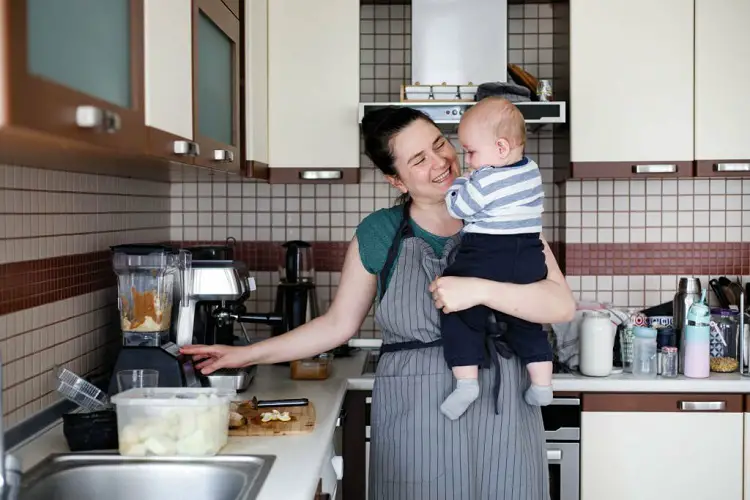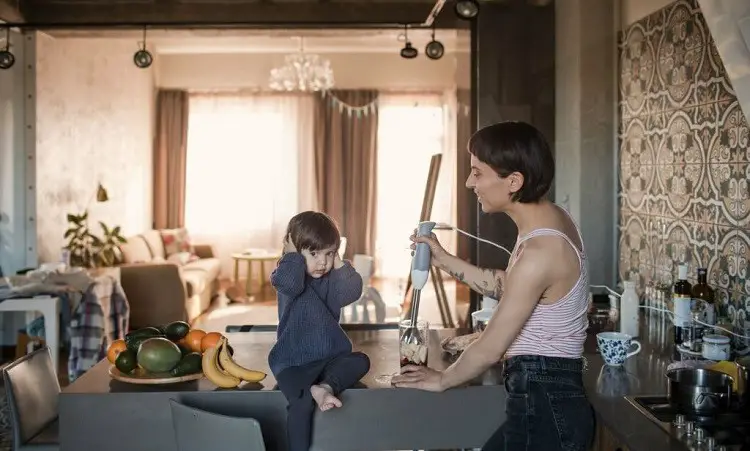Parenting comes with a lot of questions. As a parent, you may wonder, “Why is my baby scared of blender?” Thankfully, this article has the answer to one of those questions ringing in your mind.
Between 6 and 18 months, your baby’s ability to be conscious and aware of their environment keeps growing and it may also trigger sudden fears and insecurities.
Sometimes these fears become shown by their cries when they hear loud sounds like the vacuum cleaner or blender.
Fear or anxiety in children can manifest differently based on their unique personalities, experiences, and developmental stages and there are lots of predisposing factors that can make your baby scared of a blender.
This article will guide you on how to go about helping your baby overcome fear and why your baby is scared of blenders.
Table of Contents
- Is Fear A Normal Thing In My Baby’s Life?
- What Should I Do To Help My Baby Overcome Fear?
- Why Is My Baby Scared Of Blender?
- How To Help Baby Overcome The Fear Of Blenders
- Wind Up
Is Fear A Normal Thing In My Baby’s Life?
Fear is a completely normal and important part of everyone’s growth, particularly during childhood.
It can be seen as that internal alarm that goes off whenever we sense potential danger and feel the need to protect ourselves.
As adults have had years and years to our advantage that have helped us master tricks to stand up to our fears.
It’s our responsibility as parents, to teach our kids how to handle the intensity and how to go about facing their own.
One of the things your baby develops fear for is loud noise, it is normal for your baby to be scared of loud noises.
Most of the time, it can be traced back to a child not being fully aware of their surroundings, as well as an inability to identify the source of the strange noise.
Usually, the feeling goes away by itself when a child can understand the origin and the reason for the sound.
What Should I Do To Help My Baby Overcome Fear?
A child psychologist Stephanie Deslauriers explains: “Parents need to investigate the reasons behind their children’s fears, which may not always be so obvious.
It might also be beneficial for parents to look inside themselves to see if their reactions are not feeding their children’s fears.”
While it’s true that being afraid of something is a normal disposition, you need to ensure that your reaction to your child’s fear does not somehow confirm that there is something to be afraid of.
The way you react to the situation can help to put your child at ease or aggravate the whole scenario.
Your child depends on you for safety so you should have that reassuring aura around you if you sincerely want to be of help to your child.
Why Is My Baby Scared Of Blender?

Here are some of the major reasons why your baby feels uncomfortable around the blender.
1. Loud Noise
Blenders are popular kitchen appliances that are used to blend, puree, or mix food ingredients.
However, they are notorious for being noisy and producing a deafening sound when in operation.
This loud noise can be particularly alarming, especially for young children who are not accustomed to such loud sounds.
Babies and young children have sensitive ears and can be easily startled and frightened by sudden loud noises.
This can further induce a fear of the source of the noise, which in this case is your blender.
2. Unfamiliarity
As babies and young children are still learning and experiencing new things in their environment, they may become apprehensive and frightened of unfamiliar objects or situations.
For instance, the sight, sound, and movement of a blender can be entirely new and overwhelming, which could make them scared and anxious.
It is essential to be sensitive to their feelings and protect them from anything that may cause them distress or harm.
3. Vibration And Movement
The vibration and movement of a blender can be quite disorienting and unsettling for a baby, especially if they are not accustomed to such mechanical motions.
The loud noise and sudden jarring movements can be overwhelming for their senses, causing them to feel distressed and agitated.
4. Parental Reactions
Babies are highly sensitive and observant of their surroundings. They can easily pick up on their parents’ reactions and emotions, even when they are not the target of those reactions.
For instance, if a parent or caregiver uses a blender while showing fear or concern, the baby might associate the blender with something negative or frightening, which can result in fear or anxiety toward blenders in the future.
It is essential to be mindful of one’s emotions and reactions when around babies to create a positive and safe environment for their healthy development.
5. Associations With Other Experiences
Infants can associate memories and experiences with specific objects, and this can shape their future reactions toward them.
If a baby has had a negative or scary experience with a blender in the past, this experience can be strongly ingrained in their memory, leading to an association between the blender and fear or discomfort.
Consequently, when the baby sees or hears a blender, they may experience a range of negative emotions such as anxiety, fear, or distress.
6. Developmental Stage
As children grow and develop, they experience a range of developmental stages, each with its unique set of challenges.
During these stages, children may develop fears or anxieties about certain objects or situations.
These fears can be related to their cognitive, social, emotional, or physical development. For example, toddlers may develop a fear of separation from their parents, while preschoolers may have a fear of the dark.
These fears are usually a passing phase, linked to the child’s developmental milestones, and can be effectively managed with support and guidance from caregivers and educators.
How To Help Baby Overcome The Fear Of Blenders
The fear of blenders is a natural thing in the developmental process of your baby and it is something you can help them overcome genuinely and comfortably.
If you want to help your baby overcome their fear of the blender, you can try the following:
1. Gradual Exposure
Introducing your baby to new household appliances can be a daunting task, but with a little patience and care, it can be a positive experience for both you and your little one. One such appliance is the blender.
To gradually expose your baby to the blender in a controlled and comforting environment, start by allowing them to observe it from a distance while it’s not in use.
This will help them become familiar with the blender’s appearance and sound. Over time, gradually reduce the distance between your baby and the blender, always monitoring their reaction and adjusting accordingly.
You can also turn the blender on at a low speed while your baby is in the room, but at a comfortable distance, so they become accustomed to the sound.
Remember to always supervise your baby during this process and never leave them alone with the blender.
2. Positive Association
Another effective way to help someone overcome their fear of the blender is to use positive reinforcement and create a positive association with the blender.
This can be done by showing them that the blender is not harmful and can even be associated with pleasant experiences, like making a favorite smoothie.
Encourage them to touch and explore the blender while it is turned off, and gradually introduce them to its sound and movement while it is in use.
Offer positive feedback and praise for any progress they make, and consider rewarding them with a delicious smoothie once they feel comfortable enough to use the blender on their own.
By creating a positive and safe environment around the blender, you can help someone overcome their fear and develop a new positive association with this useful kitchen appliance.
3. Reduce Noise
Blenders tend to produce a lot of noise which can be disturbing for the baby. To tackle this issue, one can consider using noise-canceling headphones or earmuffs for the baby.
Noise-canceling headphones or earmuffs can help in minimizing the loud noise produced by the blender and provide a peaceful environment for the baby.
This can come in handy, especially during nap times or when the baby is sleeping.
4. Distract The Baby
If you notice that your baby is scared of the sound of the blender, one way to reduce they fear is to distract them with something else.
You can try offering your baby a toy to play with or singing a calming song to help them focus on something other than the noise.
By redirecting their attention away from the blender, you can help your baby feel more comfortable and secure in their environment.
5. Normalize the Appliance
To help your baby become familiar with a blender and its associated sounds and movements, it’s recommended to use it regularly.
This way, your baby can gradually get used to the presence of the blender and the noises it makes, which may help to prevent any potential fear or apprehension towards it.
Additionally, using the blender in your baby’s presence can also create a positive association between the blender and mealtime, which may encourage healthy eating habits in the future.
6. Stay Calm
Try to remain calm and nonchalant when using the blender around your baby. If your baby sees that you are not alarmed, they may feel more at ease.
It’s important to remember that fear of certain objects or situations is a normal part of a child’s development, and most babies outgrow these fears as they become more familiar with their environment.
However, if your baby’s fear persists or seems severe, it may be helpful to consult with a pediatrician or child psychologist for guidance on addressing and managing the fear.
By taking these steps, you can help your baby feel comfortable and at ease around the blender, making meal prep and kitchen time a more enjoyable experience for everyone.
Related Post: Why are kids afraid of Disney characters?
Wind Up
I am sure your question about why your baby is scared of blender has been answered right? The loud noise and sudden movements of the blender can be intimidating for a young child.
It is important to understand that babies are still developing their senses and are easily startled by unfamiliar sounds and movements.
Therefore, it is recommended to keep your baby at a safe distance from the blender while it is in use and to gradually introduce them to the blender over time by allowing them to watch from a distance and gradually move them closer as they become more comfortable.
It is also a good idea to distract your baby with something else, such as a toy or a song, to help them feel more at ease. Remember, it is normal for babies to be scared of certain things, and with patience and understanding, they can learn to overcome their fears.
